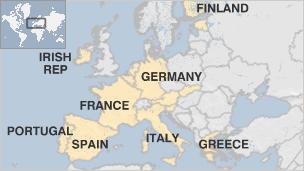What's the fuss over eurobonds?
- Published

Mr Barroso's eurobond plans may be doomed to fail
European Commission President Jose Manuel Barroso is just the latest of a string of high profile figures to back the idea of "eurobonds".
The Italian finance minister has called them the "master solution" to the eurozone's debt crisis.
Major figures in the world of finance - including billionaire investor George Soros - have also given it their blessing.
Now Mr Barroso has promised to put the idea forward for Europe's governments to consider.
But that is as far as the eurobond proposal is likely to progress, because Germany has repeatedly voiced seemingly implacable opposition to the whole notion.
So what's the argument really about?
Euro-what?
First of all, for the uninitiated, a brief explanation of what eurobonds are:
With their economies stagnating, and suffering under heavy debtloads and borrowing needs, southern European governments are finding it increasingly expensive to borrow from markets.
Meanwhile, Germany - seen by markets as the safest place in Europe to park cash - is now able to borrow at its cheapest interest rates since World War II.
Some of this reflects the greater fiscal prudence of Germany. But a lot of it also reflects structural problems within the euro that have put southern Europeans at a disadvantage.
The eurobond proposal is for all 17 eurozone governments to jointly guarantee each others' debts, in the form of common bonds.
That way all governments could borrow on the same basis and at the same cost.
Magic rule
At first glance, Germany's key objections seem obvious:

While much of the eurozone finds it hard to borrow, German borrowing costs are at a post-war low
it would put Germany on the hook for the large debts of miscreant southern European governments
this would push up Germany's borrowing costs
and it would weaken the incentive for countries like Italy or Greece to put their finances in order, if they know they can get a free ride on Germany's creditworthiness.
However, the proposal doing the rounds in Brussels - originally put forwards by euro-think tank Bruegel, external - already addresses all of these concerns.
According to Bruegel, the eurobonds should only cover debts equal to 60% of each country's annual economic output.
That magic 60% figure is the debt limit that governments originally signed up to at Maastricht as a condition for joining the single currency way back in 1992.
It is a level of debt that European leaders assumed no government should have trouble repaying, and is much lower than the current debtloads of countries like Italy or Greece.
According to Bruegel, any borrowing by an individual government above that 60% level would then have to be "subordinated" under European law.
That means that if for example Italy could no longer repay its debts, it would be legally required to cancel all payments on those subordinated debts before it could even consider touching its obligation to meet eurobond payments.
There would be no German guarantee of those debts.
US challenger
The implication is that, as far as the eurobonds are concerned, you can ignore all of the subordinated debts of each government.
Germany should never actually be called on to shoulder its neighbours' debts, because no government should ever have trouble meeting its eurobond payments.
It means Germany's cost of borrowing might actually be cheaper (although perhaps not quite as cheap as the current freakishly low levels).
Indeed, eurobonds could potentially oust US government bonds as the world's preferred safe haven investment.
Why? Because not only would the eurobond market be as deep and liquid as its US counterpart, but it would also arguably be safer, thanks to the 60% rule.
Unlike eurozone governments, the US can still issue as much debt as it likes.
Coughing up
But Bruegel's biggest argument for eurobonds is that - contrary to German claims - it would actually push countries like Italy and Greece to bring their debtloads down over the long-term.
Again, the reason is the 60% rule.
If a government wanted to borrow any money above that level, its lenders would know they stand to be the first to lose their shirts if the government defaults.
Those lenders will accordingly make governments cough up a much higher interest rate in order to borrow above the 60% level.
So governments will be forced to think twice before borrowing so heavily in future.
Unspoken objection?
Germany could be forgiven for "not getting" the Bruegel proposal, in the sense that it is counter-intuitive, and therefore a difficult sell to German voters.
They may also be concerned that the idea will be hijacked by southern Europeans keen to use eurobonds right away to slash their borrowing costs.
Indeed, Bruegel's proposal does not really provide any short-term financial help to the Italians and Greeks at all.
The whole point of the 60% rule is that governments should only be allowed to rely on eurobonds to finance a small, sensible portion of their borrowing.
And the Germans have one other objection that does stand up.
Eurobonds, at least in Bruegel's incarnation, could only be enacted via a new European treaty - a can of worms that Berlin and most other European capitals are keen not to open.
However, there may be another, unspoken objection behind Germany's opposition.
Because, as Mr Barroso points out himself, the eurobond is only part of the solution.
The whole package would require a level of political integration - with a single eurozone finance ministry and a much bigger federal budget - that Europe's governments and voters may simply not be ready to accept.